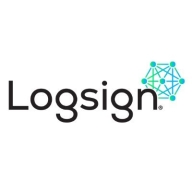

Logsign Next-Gen SIEM and Devo are popular SIEM solutions. Devo has the upper hand due to its advanced features and better performance despite its higher cost.
Features: Logsign Next-Gen SIEM offers customizable dashboards, real-time alerting, and comprehensive analytics. Devo provides advanced data correlation capabilities, scalability, and fast query performance. Devo’s performance and scalability give it an edge.
Room for Improvement: Logsign Next-Gen SIEM could enhance integration with third-party tools, simplify initial setup configurations, and improve its user interface. Devo needs better documentation, more transparent pricing plans, and enhanced multi-tenant support.
Ease of Deployment and Customer Service: Logsign Next-Gen SIEM is noted for straightforward deployment and responsive customer service. Devo is praised for deployment flexibility and robust customer support. Logsign's slightly easier deployment offers a marginal advantage.
Pricing and ROI: Logsign Next-Gen SIEM has competitive pricing and favorable ROI, attractive for budget-conscious buyers. Devo, although more expensive, offers better overall ROI due to its advanced features.
| Product | Market Share (%) |
|---|---|
| Devo | 1.1% |
| Logsign Next-Gen SIEM | 0.9% |
| Other | 98.0% |

| Company Size | Count |
|---|---|
| Small Business | 8 |
| Midsize Enterprise | 4 |
| Large Enterprise | 11 |
Devo is the only cloud-native logging and security analytics platform that releases the full potential of all your data to empower bold, confident action when it matters most. Only the Devo platform delivers the powerful combination of real-time visibility, high-performance analytics, scalability, multitenancy, and low TCO crucial for monitoring and securing business operations as enterprises accelerate their shift to the cloud.
Logsign delivers automation-driven cyber security solutions and are committed to providing the smartest, easiest-to-use and most affordable cybersecurity detection and response solutions and value-added services. Logsign Next-Gen SIEM is an enterprise-grade SIEM, inline with our promise, it's easy-to-deploy, easy-to-use and affordable unlike the other enterprise-grade SIEM softwares.
We monitor all Security Information and Event Management (SIEM) reviews to prevent fraudulent reviews and keep review quality high. We do not post reviews by company employees or direct competitors. We validate each review for authenticity via cross-reference with LinkedIn, and personal follow-up with the reviewer when necessary.